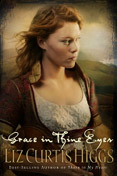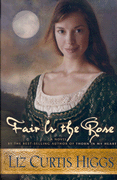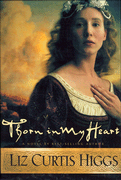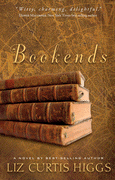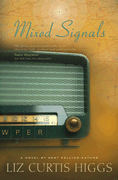
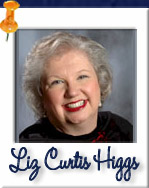
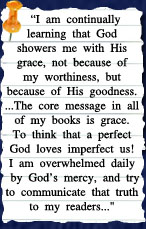
|
Focus on Fiction is pleased to feature Liz Curtis Higgs Liz has been telling tales since she attempted her first novel—handwritten in a marble notebook—at the tender age of ten. Careers in broadcasting, public speaking, nonfiction efforts, and children’s books brought her back to her first love—writing fiction—at the turn of the 21st century. Liz’s fiction includes three historical novels and two contemporary novels, Whence Came A Prince, Thorn in My Heart, Fair Is the Rose, Mixed Signals, and Bookends. Liz earned her Bachelor of Arts degree in English from Bellarmine College, and is married to Bill Higgs, Ph.D., who serves as Director of Operations for her speaking and writing office. Liz and Bill share their 19th-century Kentucky farmhouse with their two teenagers, Matthew and Lillian, and too many cats. |
|
Focus: Welcome, Liz! We’re delighted to have you join us. Before you tried your hand at writing, you were a radio personality and a successful motivational speaker. Was there a point in your life when it became evident you were called to be a writer? Or was that something you always knew you were meant to do? Liz Curtis Higgs: As soon as I learned to write sentences, I started creating stories. I still have most of those early efforts! (Please, please do not ask to see the children’s story with the self-portrait of me in a bathtub, circa 1962!) I think, deep in my youthful heart, I knew writing was what I wanted to do when I grew up. I was ten when I attempted my first novel, a Nancy Drew clone called The Mountain Cabin Mystery. The opening line not only isn’t compelling, it also includes a typo. (Since I wrote those early books by hand, would you call a mistake a “pencilo”?!) A dozen more mysteries and teen romances followed during my high school years. None of those books, Lord willing, will ever see the light of day. But clearly God was working in my heart, stirring up that storytelling desire. Even though I did not know Him yet, He definitely knew me! By the time I met the Lord in a real, life-changing way in 1982, I was five years into my broadcasting career. Though I remained in secular radio, my show definitely changed focus. Soon churches invited me to share my testimony, wrapped in a message of humor and encouragement. By 1986 I was speaking ninety times a year, working six days a week on the radio, and was expecting my first child. Uh-oh…one of those careers had to go! After a decade on the air, I put aside my radio career with fear and trembling; my professional speaking career began after the arrival of our son, Matthew, in August 1987. As Matt grew, so did my speaking platform—from local to regional to national opportunities. I also finished my bachelor’s degree in English—eighteen years and three colleges later!—rekindling my desire to write. When our daughter, Lilly was born in 1989, I was ready to get serious about writing, and so the journey toward publication began in earnest. Focus: You began your writing career as a nonfiction author, writing titles that included Bad Girls of the Bible, Really Bad Girls of the Bible, and your latest release, Unveiling Mary Magdalene. Why did you choose to write nonfiction first? Liz Curtis Higgs: My early books—starting in 1993 with “One Size Fits All” and Other Fables (Thomas Nelson)—were an extension of my presentations. I developed platform messages, then delivered them over and over, honing the material before finally putting the messages in book form. By 1998 Nelson and I had published seven such books together. All of them are out-of-print now, by my choice, simply because my writing career has taken such a different turn. My children’s books came along in 1995 with The Pumpkin Patch Parable and four others through 1998. By then, my speaking career was moving in a new direction. Instead of mostly-funny presentations for women in any setting—healthcare, education, business—I was doing more biblically-based messages specifically aimed at Christian women. Still with some humor, but definitely with more spiritual content. With Bad Girls of the Bible, I put together the fiction-plus-Bible-study concept, did extensive research, wrote the book, and then took the message onto the platform. So, I became a writer who also gave speeches, rather than a speaker who also wrote books. Instead of doing 100+ keynote presentations a year, speaking once each time, I was doing 40+ weekend conferences, speaking several times at each event. Again, it was a shift in thinking, from performance to ministry. Praise God for His patience! Finally, with Bad Girls of the Bible, I was writing what I truly loved, combining fiction with nonfiction, and Bible study with humor and encouragement. Focus: Can you tell us a little about the intriguing woman on the cover of Bad Girls of the Bible? How did your publisher find her, and does she model veils elsewhere? Liz Curtis Higgs: Oh, dear. That is, of course, my Former Bad Girl self! Despite my protestations, WaterBrook Press wanted my face on the cover of Bad Girls of the Bible. Which meant, of course, that I ended up on the cover of Really Bad Girls of the Bible and Unveiling Mary Magdalene, too. The photo session was a hoot, but I can promise you this: no more cover shots for this girl! Focus: How did you feel the first time you went into a store to buy a card or gift, and saw your book, with your name on it, on the shelf? Liz Curtis Higgs: Stunned, of course. Embarrassed and excited. Joyful and fearful. Will anyone buy it? If they read it, will they like it? I’ve been through the process twenty-two times and those concerns never go away. Only when letters and emails from happy readers appear in my mailbox do I let out a big sigh of relief. Focus: Was the power of biblical stories, like those you highlight in your nonfiction books, what motivated you to write fiction? Liz Curtis Higgs: Actually, my desire to write fiction came long before I began focusing on the women of the Bible. In 1995 I was introduced to Christian fiction by a bookseller who’d set up a booth at one of the conferences where I was speaking. I was a huge fan of general women’s fiction, and she said, “Then you must read ‘The Mark of the Lion’ series by Francine Rivers. She used to write for general houses and now she writes Christian fiction.” Of course, I was completely blown away by Francine’s trilogy, and the power of fiction to communicate the truth of the Gospel at a very deep level. Next I read Jack Cavanaugh, also an amazing writer, and then a scary thing happened. God clearly spoke to my heart: “This is what I have next for you.” I was so undone I didn’t tell a soul, not even my husband. Fiction? Me? The idea was so crazy, I figured it had to be God! I quietly began researching the fiction-writing process, interviewing authors (including Francine and Jack), and trying my hand at writing scenes. Though in my heart I always knew I would end up writing Scottish historical fiction—my favorite genre and setting to read—I began with contemporary, light-hearted novels because they were a natural extension from the kinds of books I was writing in the mid-1990s. Both Bad Girls and my first novel, Mixed Signals, were written in 1998 and published in 1999. Focus: In that first fiction book, Mixed Signals, you give readers some great insights into the wild and wonderful world of radio. How did your experiences in the radio industry influence the way you shaped your characters, Belle O’Brien and David Cahill? Liz Curtis Higgs: The pros say, “Write what you know,” so I drew from my decade in radio to create my first novel. Lots of the crazy stuff that happened to Belle happened to me, too! Though Belle and I have very little in common physically—she is a petite redhead and I’m not—we both married broadcasting engineers at age thirty-two! My husband, Bill, and David Cahill are also very different. David is younger than Belle by five years and a moody former Bad Boy, while my Bill is two years older than me and an easygoing, quintessential Good Guy. I had a ball writing Mixed Signals, and am so tickled Multnomah Publishers recently repackaged both this novel and my second contemporary, Bookends, giving them nice, warm covers and inviting me to add Reader’s Guides in the back. Focus: Bookends, which is set in the Moravian community in Pennsylvania where you grew up, features opposite personalities Emilie Getz and Jonas Fielding. These characters were so much fun! How much of Emilie’s rediscovery of her faith mirrored that of your own? Liz Curtis Higgs: Emilie and I have even less in common than Belle O’Brien and I have! Emilie is one of those ultra Good Girls who thinks she knows God until she discovers she knows about God, but doesn’t truly know God in a personal way. I, on the other hand, was a Bad Girl who knew nothing about God and was proud of it! Yet I’ve met many an Emilie in my time and loved getting to know this one. Jonas was even more fun to flesh out—a handsome, funny man who loves the Lord and is on a mission to make too-serious Emilie laugh. I can’t tell you the number of readers who’ve written me to say, “Please tell me there is a Jonas out there for me!” To create Emilie and Jonas, I made a list of about 50 attributes for Emilie, then came up with the exact opposite trait for Jonas. She is up tight, he is laid back; she is detail-oriented, he’s a big-picture guy; she likes classical music, he likes bluegrass. You get the idea! It was soooo fun to put these two in a scene and watch the sparks fly. Focus: Let’s talk about the sparks in your riveting current series, Thorn in My Heart, Fair Is the Rose, and Whence Came a Prince. You based these books on the biblical story of Jacob, Leah, and Rachel. What gave you the idea to change the setting to 18th-century Scotland? Liz Curtis Higgs: Ah, the books of my heart! Remember I said I always knew I would write Scottish historical fiction someday? Well, I began researching Scotland with my first visit there in 1996, not knowing what story I was going to tell or what publisher might be interested in it, just obediently doing the work, waiting for God to give me the right story. Then came the three Bad Girls books and months upon months of studying the various women of the Bible. Among them are two sisters—Leah and Rachel—whose stories so intrigued me that I began exploring the possibility of telling their tale in novel form. I was already 25,000 words into a Scottish historical novel that was fully plotted and researched, but wasn’t quite working for me, when it hit me: Leah and Rachel’s story was the story I’d been waiting to tell! In 2002 I put aside that partial manuscript and started fresh with Leah’s story in Thorn in My Heart. The rest is, if not history, at least historical fiction! :>) Focus: In order to write this series, you must have spent hundreds of hours in research. Was your husband’s educational background a help to you as you studied Jacob’s life? Liz Curtis Higgs: Bill always makes me do my own research. Yes, he does have a Ph.D. in Old Testament languages, but wisely, dear hubby knows I won’t learn anything if I don’t dig out the answers for myself. So I used ninety different commentaries and other reference books on Genesis and the Jacob story, plus fourteen translations of Genesis 25-35 to write this series. Once I had all my notes together (hundreds of pages of single-spaced quotes from the various resource books), I sat down with Bill and went over them, sharing both the research itself and my own discoveries and conclusions, giving him a chance to offer further insights and (very important!) keep me from jumping to conclusions that the original text will not support. Once I knew the Genesis story backwards and forwards, then I began doing the Scottish research, including many trips to bonny Galloway, then the historical research, drawing from my collection of seven hundred and fifty books about Scotland, all with the goal of bringing the biblical story alive in another time and place. My prayer is that when readers close each novel, they will turn to the Bible and read the real story with fresh eyes. Focus: Of all the new knowledge you gained through your study of Jacob, what was the most life changing for you personally? Liz Curtis Higgs: Alas, Jacob is not a true hero, and so my Jamie McKie—handsome and likeable as he is—remains deeply flawed. He makes endless mistakes and keeps forgetting his promises to God—and more importantly, forgetting God’s promise to him: “I am with you and will watch over you wherever you go.” (Genesis 28:15 NIV). As I wrote about this flawed man, my own failings kept staring me in the face. And as I considered the faithfulness of God, I was haunted by my own unfaithfulness. So, as Jamie learned to trust God and to receive God’s forgiveness, knowing he did not deserve it, so I am continually learning that God showers me with His grace, not because of my worthiness, but because of His goodness. Focus: The relationship between Leana and Rose in Thorn in My Heart and Fair Is the Rose has generated a lot of your reader mail. Can you share some of the feedback you’ve received? Liz Curtis Higgs: It would have been easier to tell a story in which two sisters in love with the same man loathed each other. But of course, I never do anything the easy way! There’s a great deal more internal and external conflict involved if the two sisters truly care for each other, leaving them ever torn between the sister they’ve loved all their life and the man who cannot decide between the two of them. Ayee, what a triangle! The feedback has been fascinating. Most readers cheered for older, wiser, quieter Leana from the first book, but younger, bonnier, livelier Rose had her fans as well. As Jamie’s affections waffled, I wanted readers to feel that same shift in loyalties. Indeed, many wrote and said, “In one chapter I wanted Rose to win his heart, then in the next, Leana!” Exactly what I was hoping for. Not because I wanted to drive readers crazy, but because I wanted them to explore each character’s heart in a meaningful way. Relationships in life are complicated; so should they be in a novel. By the time we get to Whence Came a Prince, some of those issues have been worked through, only to be replaced, of course, with new conflicts. That’s what keeps the pages turning, both for the writer and for the reader. Focus: In Whence Came A Prince, you allow us glimpses into Lachlan’s point of view. Lachlan is certainly a salty—and at many times unpleasant—character. But what do you love about him? What important perspectives do you think he conveys? Liz Curtis Higgs: I wouldn’t say I love Lachlan McBride, but I certainly do find him fascinating! Villains have a certain appeal because we compare ourselves to them and conclude, “Whew! At least I’m not that bad!” In this case, I wanted readers to despise him as much as Jamie did, so that when Lachlan finally gets his comeuppance, we all cheer, knowing justice has been served. Lachlan is based on Laban of the Bible, of course, who is a trickster and then some. He shows us the ugly side of a life lived for selfish gain. Focus: You immersed yourself in all things Scottish in order to give your books their tremendously authentic feel. This immersion included tons of reading and research, and seven trips to Scotland. Would you like to tell our readers about the experience you and your camera had with a Scottish angel on a hill in than fine country? Liz Curtis Higgs: Tee-hee. On one of my many solo trips to Galloway I was climbing up a steep mountain, determined to photograph an historic monument in the remote wilds of Glen Trool, with my new Canon slung around my neck, and not a soul in sight. When I suddenly tumbled off my rocky perch, landing camera-first, who should appear out of nowhere to rescue me but a professional photographer (!) who fixed my dirt-covered camera and helped me limp to my car before disappearing into the glen. If you want to read the whole story, follow this link to an article I wrote for Today’s Christian Woman called “The Angel of Glentrool”… http://www.christianitytoday.com/tcw/2004/002/19.80.html Does God watch over us, or what?! Focus: Although Whence Came A Prince is the conclusion of your Scottish trilogy, your readers can expect another exciting story set on those bonny shores in March 2006. Can you give us a sneak peek at your next book, Grace in Thine Eyes? Liz Curtis Higgs: With joy! Although my trilogy covers Genesis 25-35, there is an omitted chapter in the series, simply because I truncated a 20-year saga into a 2-year time span. That missing chapter is the story of Jacob and Leah’s only daughter, Dinah, found in Genesis 34. If you know the biblical account, you know what lies in store for Jamie McKie’s daughter and sons—lost innocence, violent revenge, and a desperate search for redemption. Though Grace in Thine Eyes will be a stand-alone novel, think of it as the “next generation” of the McKie family. The year is 1808, the setting is both Glentrool and the Isle of Arran off the western coast of Scotland, and the main character is Davina McKie. Wait until you see the beautiful cover WaterBrook Press has created for Grace in Thine Eyes! Focus: You’ve said you believe writing is a calling God has placed on your life. How do you strive to fulfill that call, and what overall message do you hope your readers will glean from your books? Liz Curtis Higgs: I believe God has called every believer to serve Him in some capacity. No one area of service is more important to the Body of Christ than another. For this season of my life, exploring the stories of women of the Bible through fiction is the passion God has poured into my life, and I am honored and blessed to serve Him with all my heart. The core message in all of my books is grace. To think that a perfect God loves imperfect us! I am overwhelmed daily by God’s mercy, and try to communicate that truth to my readers in as many ways as I can. Focus: Other than sending you encouraging letters and posting reviews of your books on Amazon.com, how can readers and fans encourage you as you pursue this great calling? Liz Curtis Higgs: Those two methods are a huge blessing, for sure! I always respond personally to every letter and email, and as you can imagine, thoughtful reviews posted on the Internet make my heart sing. Telling friends about your favorite books or authors is another means of supporting writers you love. Buying copies for gifts is wonderful, too. If your shelves are brimming with books you enjoyed but aren’t likely to read again, why not donate them to a library, so others can become familiar with that author’s work, too? For me, it’s not about the number of books sold, it’s about the potential number of lives touched and hearts changed. My readers are very precious to me! Focus: Is there anything else you'd like your readers to know? Liz Curtis Higgs: Oh, yes! “Christ Jesus came into the world to save sinners—of whom I am the worst. But for that very reason I was shown mercy so that in me, the worst of sinners, Christ Jesus might display his unlimited patience as an example for those who would believe on him and receive eternal life. “ (1 Timothy 1:15-16 niv). That’s the heart and soul, not only of my books, but also of my life as a woman who loves Jesus. What a hero! What a Savior!
|











© Focus on Fiction, 2003-2005 All Rights Reserved. Site maintained by PulsePoint Design. Direct questions or comments here
| Home | Upcoming Author Interviews | Past Author Interviews | Christian Fiction Reviews | About Us | | FAQ’s | Contact Us | Links |
